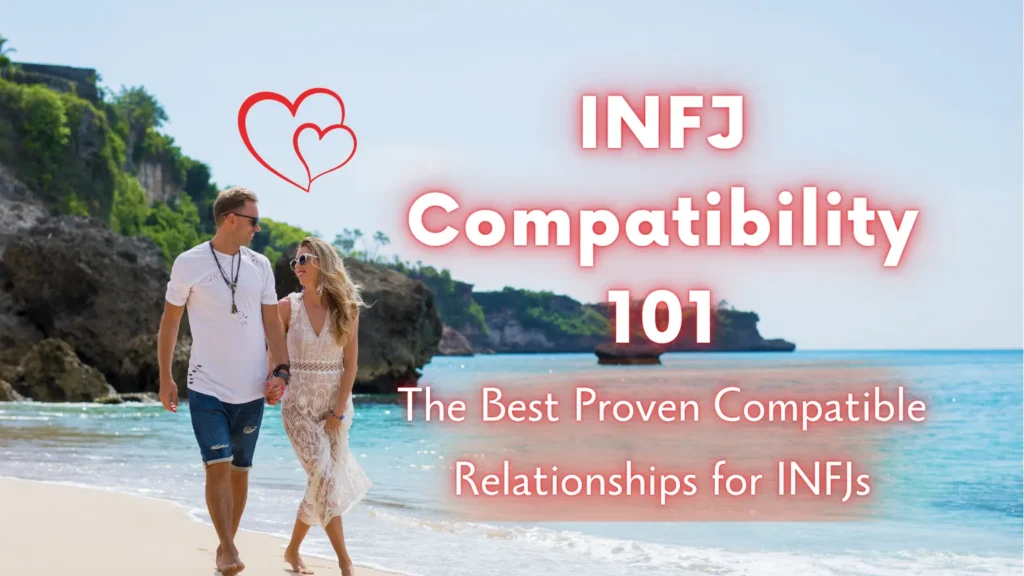Do you want to gain an in-depth analysis about the INFJ Compatibility and how it plays out in the real world? If yes, you have come to the right place.
If you’re an INFJ, you’ve probably asked yourself more than once:
- “Why is it so hard to find someone who understands me?”
- “Is there truly a best match for INFJ personalities or am I destined to walk this path alone?”
- “Could another INFJ be the only one who can meet me where I truly live – inside my heart, my dreams, my soul?”
INFJs are the rarest of all personality types.
Deeply intuitive. Emotionally layered. Spiritually charged.
But when it comes to relationships, your rarest gift can often feel like your heaviest burden – because superficial connections simply don’t satisfy you.
You’re not here to date casually.
You’re here to find the one. The perfect match.
Someone who mirrors your depth, honors your silence, and joins you in crafting a love that feels like home.
In this blog, we’ll explore:
👉 The best romantic matches for INFJs (including INFJ-INFJ pairings)…
👉 A clear compatibility blueprint for INFJ relationships…
👉 The personality types INFJs get along with and the ones they don’t?
👉 Who the ideal partner for an INFJ female or male might be?
👉 What makes a soulmate connection truly work for the INFJ heart?
So if you’ve been wondering who should an INFJ marry, or what’s the most compatible personality type for INFJs, take a deep breath…
You’re about to receive the clarity your heart has been quietly longing for.
Let’s decode your compatibility patterns and guide you to your soul-designed partner.
Table of Contents
What INFJs Truly Seek In a Relationship (Cognitive Function-Based Soul Desires)
This is the question I’ve been asking myself for the last nine years.
And no, I’m not exaggerating when I say I’ve spent close to 90% of my energy trying to figure it out.
I’ve asked MBTI experts, devoured books, reflected on my own relationships, and studied hundreds of singles and couples across the world, especially the sensitive, soulful ones like you and me.
Back in 2021, I was attending a masterclass for INFJs hosted by Wenzes – an incredible INFJ Life Coach I deeply admire.
I remember raising my hand and asking:
“Which MBTI personality type© is truly the most compatible with an INFJ?”

Her answer?
“Every type can be compatible. It depends on the individuals.”
But something inside me still felt incomplete. I had a knowing.
There had to be a deeper framework behind it all. And I was determined to find it.
So I began devoting myself to understanding compatibility from both a psychological and spiritual lens.
After working as a relationship coach under the banner of Love Catalyst, I eventually created a sacred compatibility model based on cognitive function alignment + soul desire resonance.
Let me now share what I discovered.
Because once you understand what your INFJ soul truly seeks in a relationship, you’ll stop settling for chemistry and start seeking sacred compatibility.
1. INFJs Seek Meaning, Purpose & Vision
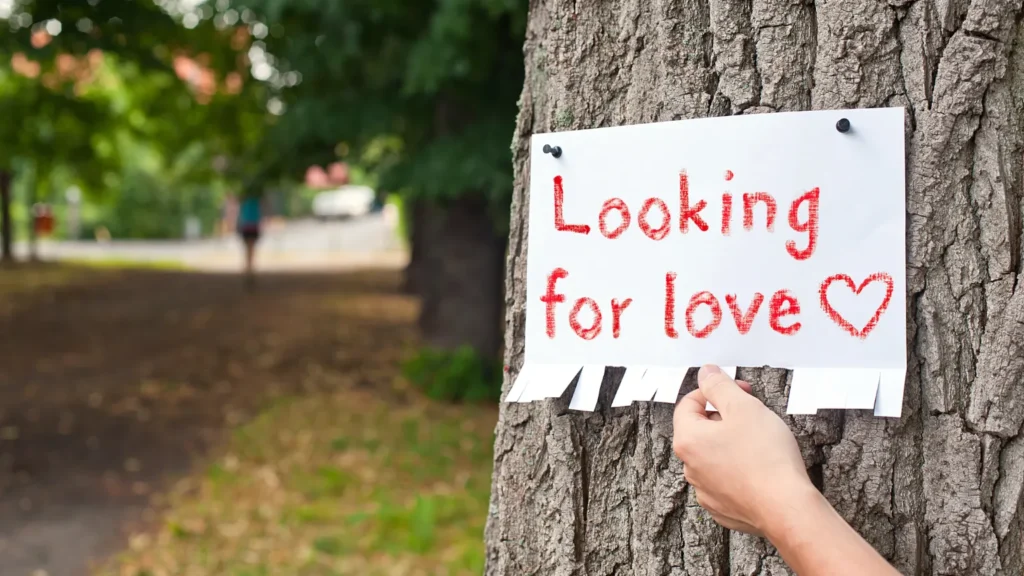
(Ni – Introverted Intuition: The Soul’s Lighthouse)
INFJs don’t just fall in love. We merge our body, mind, and soul.
We’re not here for “cute couple goals” or a cozy Saturday routine.
We’re here to build something eternal with a partner who can see the big picture – emotionally, spiritually, and generationally.
Ni (Introverted Intuition) is our hero function. It’s the part of us that constantly asks:
- “Why are we really together?”
- “Where is this relationship going?”
- “Is there a divine reason behind our meeting?”
If these questions go unanswered, the relationship starts to feel hollow – no matter how pleasant it looks on the outside.
For instance, if you’re an INFJ and you ask your partner:
“Tell me 20 reasons why I matter to you,”
and they respond with,
“Because we liked each other and it just happened…”
You’ll probably feel a quiet ache in your heart. Because liking isn’t enough. You’re looking for purpose.
Now contrast that with:
“We were born to be with each other. I see us as two souls on a shared mission, here to heal, grow, and create something bigger than us.”
That’s when an INFJ’s heart lights up.
We’re constantly zooming out – thinking about how our connection will feel in 10, 20, even 40 years.
What are we building together?
Are we aligned in values, in purpose, in vision?
If you can’t answer the “why” behind your love, it won’t feel grounded enough for your intuitive spirit to rest in.
2. INFJs Crave Deep Understanding & Divine Harmony

(Fe – Extraverted Feeling: The Heart’s Compass)
We INFJs don’t just want to be seen – we want to be felt.
We yearn for someone who can meet us in the subtle layers of our emotional world.
Someone who doesn’t flinch when we cry or go quiet, but leans in with warmth and curiosity.
Fe (Extraverted Feeling) is our parent function. It makes us deeply attuned to others’ emotional states. It’s why we often ask:
“What’s on your mind?”
“What are you feeling right now?”
“Tell me everything. I want to understand you.”
But here’s the hard truth – if we’re in a relationship with someone emotionally unavailable, closed off, or judgmental, we start doubting ourselves.
We wonder:
- “Is something wrong with me?”
- “Why can’t they feel what I’m feeling?”
- “Am I too much?”
The truth is, you’re not too much. You’re just asking for what your soul needs.
INFJs feel most loved when someone mirrors their depth – not just with affection, but with emotional understanding, attunement, and sacred listening.
Remember, some types prioritize convenience over connection. But you? You’re built for divine intimacy.
3. INFJs Need Clarity, Cohesion & Mental Peace

(Ti – Introverted Thinking: The Inner Analyst)
While INFJs are deeply emotional, we’re also highly analytical.
Ti, our 10-year-old function, wants to make sense of the world – and especially our relationships.
We don’t just want to feel good; we want to understand why we feel what we feel.
We silently ponder:
- “Why is this dynamic happening?”
- “What’s the logic behind their behavior?”
- “What if they leave me? What if I leave them? What would be the reason?”
You may never say this out loud. But these questions swirl inside – because you’re always looking to connect emotion with logic, intuition with insight.
And here’s where some partners can get it wrong.
Types high in Te or Fi might mistake our curiosity as criticism.
They might say,
“Why are you overthinking?”
“Why can’t you just be in the moment?”
But INFJs aren’t overthinking – we’re trying to create inner peace.
We want to understand the why behind choices, behaviors, emotions – so we can rest in emotional clarity and intellectual closure.
Open communication is sacred to us. Without it, intimacy fades.
4. INFJs Thrive on Intensity, Energy & Sacred Impact
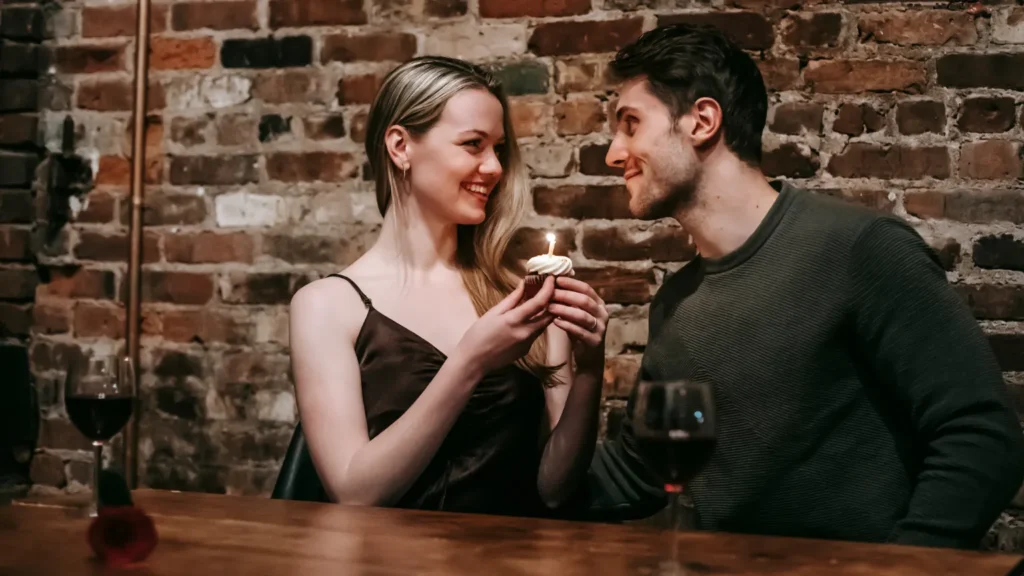
(Se – Extraverted Sensing: The Sleeping Volcano)
INFJs may seem calm, gentle, even quiet.
But inside, we burn like fire.
We don’t just want connection. We want intensity. We want to feel activated in our body, mind, and soul. That’s the gift of our aspirational Se.
A soulmate relationship for an INFJ isn’t passive. It’s charged, passionate, creative, and electric.
You want to make love, make memories, make meaning, and make a difference together.
In short, you don’t want a partner you can just chill with.
You want someone whose presence sets you on fire.
You also want:
- Deep physical intimacy (not just touch but transcendence)
- Sacred impact (on your life, their life, and the world)
- Emotional intensity that stretches your soul in beautiful ways
If your partner lacks intensity or isn’t inspired to do something greater together – you’ll eventually feel like your soul is starving.
In a Nutshell…
INFJs desire a soulmate relationship that:
- Makes deep, divine sense (Ni + Ti)
- Feels emotionally safe and sacred (Fe)
- Awakens intensity and inspires impact (Se)

Without these, the relationship feels incomplete.
That’s why not every “good guy” or “good girl” will click with you.
You’re not built for convenience.
You’re built for congruence of mind, heart, body, and soul.
And in the next section, I’ll walk you through exactly which MBTI types can meet you there and which ones fall short.
Ready to decode your compatibility?
👉 Head over to: INFJ Compatibility Chart
The Compatibility Blueprint for INFJs (A Sacred Overview)
By now, you deeply understand the four core soul desires every INFJ seeks in love—Meaning (Ni), Emotional Understanding (Fe), Clarity (Ti), and Sacred Impact (Se).
But before exploring compatibility charts and types, let’s reflect on a deeper question:
Convenience or Understanding: What Do INFJs Truly Seek?
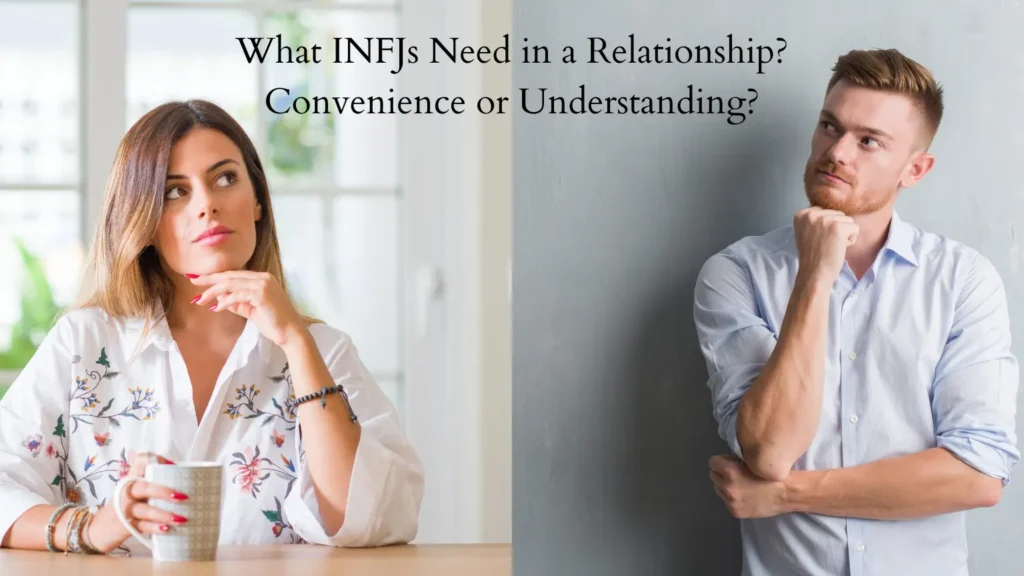
The majority of people prioritize convenience in relationships. They want a partner who makes their lives easier, someone easygoing, drama-free, and comfortable to live with. And while INFJs appreciate peace and harmony, their inner blueprint seeks something far more meaningful.
INFJs thrive on deep understanding—a soul-level resonance that transcends convenience. They’re not looking for someone who simply fits into their routine; they’re searching for someone willing to venture deeply into emotional and spiritual intimacy.
Convenience might make a relationship comfortable, but deep understanding is what makes love sacred and lasting for an INFJ.
Convenience vs. Understanding: Why INFJs Choose Depth Every Time
INFJs don’t settle for casual connections or surface-level bonds. Instead, they crave emotional transparency, authenticity, and profound resonance. For an INFJ, love is not about merely co-existing. It’s about profoundly connecting and co-evolving.
A convenient partner might say, “Why overthink? Let’s just have fun,” whereas an understanding partner would gently ask, “Can you tell me what you’re feeling? I want to truly understand.”
INFJs always choose the partner who offers understanding, even if that means navigating emotional complexities.
The Sacred Compatibility Teaser: Top 2 INFJ Matches Explored Deeply
Certain MBTI types naturally resonate with the INFJ’s soul blueprint.
Over the past nine years, I’ve reflected deeply on what compatibility truly means for an INFJ like myself.
I’ve spent countless hours reading books, speaking with MBTI experts, attending masterclasses, and having heartfelt conversations with hundreds of INFJs worldwide.
And through all these experiences, one truth stood out clearly: INFJs like us aren’t looking just for relationships of convenience; we’re yearning for relationships of profound understanding.
For me, compatibility has never really been about simple, surface-level similarities – favorite movies, hobbies, or weekend routines.
Those things might create initial sparks, but they rarely build lasting emotional bonds.
Instead, true INFJ compatibility is rooted deeply in emotional intimacy, spiritual resonance, and the shared commitment to mutual growth.
Based on my research and integrating all of my personal life experience, I’ve identified the top three compatibility matches. Let’s dive deeper into why these pairs resonate profoundly.
1. INFJ + INFJ Compatibility: The Sacred Mirror Relationship

When two INFJs unite, it’s both an extraordinary blessing and a profound emotional challenge.
Each partner reflects the other’s innermost emotions, desires, and hidden fears.
Conversations flow intuitively, often without words, creating an emotional sanctuary of deep comfort and understanding.
Let me share a deeply personal example.
As an INFJ myself, finding someone who genuinely understood the depths of my heart always felt like an impossible quest – until I met my soulmate, who is also an INFJ.
The connection we share is extraordinary, a powerful mirror reflecting both our brightest aspirations and our most profound vulnerabilities.
Conversations flow effortlessly because, instinctively, we understand the silent languages each other’s hearts speak.
Advantages of a INFJ-INFJ Relationship – Why This Pair Works?
- Soulful Depth: Two INFJs share unparalleled emotional and spiritual depth. Each partner instinctively knows how to support and nourish the other’s inner world.
- Shared Vision: Both partners intuitively envision their future with clarity, purpose, and aligned values, fulfilling their Ni-driven need for meaningful direction.
- Emotional Safety: Each partner deeply values emotional safety, naturally providing a safe space for vulnerability and authentic expression.
However, we’ve also learned firsthand that the intensity of two INFJs together requires intentional grounding practices.
Otherwise, our deep emotions could spiral into overwhelming complexity.
Challenges to Watch in a INFJ-INFJ Relationship:

- Emotional Spirals: Without grounding practices, INFJ couples risk amplifying each other’s emotional anxieties, potentially becoming trapped in endless cycles of deep introspection.
- Overanalysis: Two Ni-driven individuals might endlessly overthink, sometimes paralyzing practical decisions or actions.
Key for Success for a INFJ-INFJ Relationship:
- Regular emotional check-ins.
- Mindfulness practices.
- Grounding activities.
- And most importantly maintaining individual spiritual practices help keep the INFJ-INFJ relationship balanced, healthy, and enriching.
2. ENFJ + INFJ Compatibility: The Heart-Led Visionaries

This is a match rooted in powerful emotional connection (Fe) and visionary alignment (Ni). INFJs often feel energized and uplifted by the warmth, charisma, and emotionally supportive presence of an ENFJ.
Some of my closest childhood friends happen to be ENFJ men, each happily married to INFJ women.
Witnessing their relationships up close has taught me something beautiful: the emotional warmth, openness, and expressive nature of ENFJs naturally creates a sanctuary where INFJs feel truly safe, loved, and profoundly understood.
These couples radiate a harmony that’s inspiring – demonstrating daily that when emotional safety and heartfelt communication align, love becomes sacred.
Advantages of a ENFJ-INFJ Relationship – Why This Pair Works?
- Emotional Harmony: Both INFJs and ENFJs prioritize emotional connection, harmony, and collective well-being. ENFJs naturally create emotional safety, allowing INFJs to express themselves openly and authentically.
- Complementary Energy: The ENFJ’s outgoing warmth beautifully complements the INFJ’s reserved depth, creating a balanced dynamic that promotes mutual growth.
- Aligned Visions: Both types are deeply idealistic, aiming to create meaningful change in the world. Together, they can channel their joint energies into impactful projects or life missions.
However there are also challenges in this ENFJ-INFJ compatibility relationship.
Challenges to Watch in a ENFJ-INFJ Relationship:

- Burnout: Both types often overextend themselves emotionally, risking exhaustion. They must consciously practice emotional boundaries and self-care.
- Conflict Avoidance: Both INFJs and ENFJs dislike conflict, potentially avoiding necessary tough conversations. Clear communication and mutual courage to address conflicts are crucial.
Key for Success:
- Prioritize emotional honesty.
- Regular self-care routines.
- Openly communicate boundaries to sustain the relationship’s warmth without emotional fatigue.
Explore INFJ Compatibility With All the 16 Personality Types

Now, I know you might be wondering…
“What about INFJ + INFP? Or INFJ + ENFP? What about INFJ + INTJ or INFJ + ENTP?
Aren’t those considered good matches too?”
Yes, they are often talked about and in many places, you’ll find beautifully written explanations that make these pairs sound golden.
And trust me, I could write golden words too.
I could paint poetic paragraphs about each of those matches.
But that’s not why I’m writing this blog.
I didn’t come here to sugarcoat compatibility.
I came here to tell you the truth.
Because I’ve lived the INFJ journey from the inside out.
I’ve felt the pain of being misunderstood in a relationship that looked great on paper but felt hollow in the heart.

I’ve spent sleepless nights wondering if something was wrong with me – when in truth, I was just with someone who couldn’t see the depth I carried.
And I don’t want that for you.
If you’re an INFJ reading this, please know – I won’t misguide you.
I won’t feed you feel-good fluff that sounds comforting but leaves you stuck in years of emotional confusion.
Everything I share is rooted in real-life observations, scientific cognitive function theory, and nearly a decade of deep personal and professional research into compatibility, relationships, and emotional healing.
That’s why I’ve highlighted only two sacred soulmate matches in this blog – INFJ + INFJ and INFJ + ENFJ – because these are the pairings I’ve seen consistently work with emotional grace, spiritual alignment, and mutual soul growth.
That said, each INFJ is unique, and love can evolve in beautiful ways even with contrasting types – when both partners are emotionally mature, self-aware, and soul-ready.
Let’s continue walking this truth-based path together.
You deserve clarity. You deserve alignment.
You deserve love that meets you where you are and rises with you into where you’re meant to go.
In the next sections, we’ll go even deeper into INFJ-specific nuances – like the difference between INFJ-T and INFJ-A, how compatibility shifts for INFJ men and women, and what to keep in mind with more complex matches.
Are you ready to decode your connection style on a whole new level?
Let’s continue the journey together.
Best Partner for INFJ Female vs. INFJ Male
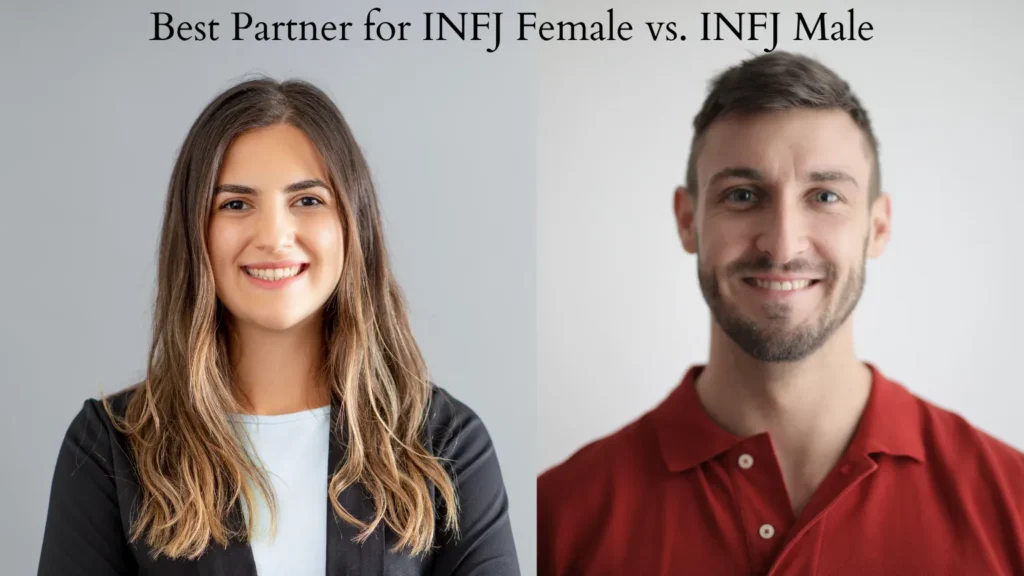
While INFJs across the gender spectrum share the same deep yearning for emotional intimacy, spiritual alignment, and soulful connection, the way that longing expresses itself can be very different depending on whether you’re an INFJ woman or man.
I’ve come to understand this not just through theory, but through the very life I’ve lived.
As an INFJ man, in a sacred relationship with my INFJ soulmate, I’ve seen with stunning clarity what we each truly seek – not just in love, but in life.
And this clarity wasn’t born from books or charts.
It came from lived experience: through years of observing my clients, interacting with hundreds of INFJs in deep coaching spaces, through friendships, conversations, heartbreaks – and through two very personal relationships that shaped me: my INFJ ex-partner and my own mother, who is also an INFJ.
Each INFJ taught me something different. Each showed me how beautifully complex and sacred our longings really are.
INFJ Female: The Nurturing Mystic

The INFJ woman walks through life with quiet strength and a heart full of sacred fire.
She is fiercely independent – often capable of managing her life, her dreams, and her responsibilities without anyone’s help.
And yet, when she enters a soulmate relationship, something tender within her awakens: the deep desire to nurture, to pour, and to love fully with soul and softness.
She doesn’t need a partner to complete her.
She is whole already.
But she longs to be with someone who understands her wholeness, and gives her the freedom to be deeply feminine in her own sacred way.
She doesn’t want rigid roles or old-school shackles that box her in.
She doesn’t want to be forced into outdated expectations of what an “ideal wife” or “ideal woman” is supposed to be.
What she wants is trust.
Trust that she will take care of the nurturing, emotional, and intuitive aspects of the relationship and the family – in a way that’s uniquely her own.
Trust that she doesn’t need to be micromanaged or molded.
She simply needs to be believed in.
In the home, she may not follow the traditional route.
She might not cook every meal, keep everything Pinterest-perfect, or play by society’s outdated rules of “how a wife should be.”
But in her own quiet, powerful way – she will find elegant, soul-aligned solutions to life’s problems.
She’ll bring warmth, peace, and emotional safety into the home.
She’s not conventional.
She’s conscious.
And when she is trusted, supported, and emotionally protected – she blossoms into the kind of woman who can pour soul into her marriage, her children, and her family in ways that transform generations.
But like all INFJs, she has a vulnerable inner world too. One that longs for:
- Unshakable understanding
- Fierce loyalty
- Emotional presence
- And above all, deep, unconditional love
She doesn’t just want a husband or a partner.
She wants a soul companion – someone who doesn’t just share responsibilities, but shares silence, vision, dreams, healing, and depth.
When the INFJ female feels emotionally safe and spiritually free, she will not only nurture love, she will elevate it.
She will become the soul of the home, the wisdom-keeper of the family, and the quiet lighthouse that everyone turns to in times of chaos.
Not because she has to, but because it’s who she is.
Give her love, belief, and freedom and she will give you a world that feels like home.
INFJ Male: The Visionary Protector

The INFJ man may not always speak the loudest in the room, but his presence carries weight.
He is calm on the surface, yet underneath lives a soul that burns with vision, responsibility, and unshakable purpose.
He’s not here for shallow roles or performative masculinity, he’s here to protect what is sacred, and to provide for the people he loves from a place of depth and devotion.
At his core, the INFJ man feels a deep, almost ancestral pull to create emotional and financial safety for his family.
He dreams of giving his wife the space to rest into her feminine energy without fear, and his children the kind of nurturing, grounded fatherhood he may never have experienced himself.
He wants to be the man his family knows they can count on – not just for material needs, but for soul presence.
But he’s not driven by status or ego.
He’s driven by impact.
His purpose is often invisible to others – he sees things that no one else sees.
He feels the pulse of problems that society hasn’t even acknowledged yet.
His mind isn’t stuck in “making a living”; it’s focused on creating a life that matters.
And because his vision is so abstract, so ahead of its time – he often feels deeply misunderstood.
His thoughts may seem scattered.
His ideas may look unrealistic.
And yet, his inner compass keeps pulling him forward.
That’s why the INFJ male doesn’t need a partner who just loves his presence.
He needs a partner who believes in his path, even when it’s unclear.
Someone who doesn’t ask, “Will this work?” but whispers, “I trust who you are becoming.”
The INFJ man needs space – emotional, creative, and spiritual space – to fully evolve into the provider and protector he was born to be.
Not in the macho sense, but in the deeply sacred sense.
He needs time to dream, time to build, and the freedom to make mistakes without being shamed.
What he truly longs for in return is simple, yet rare:
- To be seen for who he is, not just what he does
- To be understood in his complexity, not simplified or judged
- To be trusted as he walks a path few will ever comprehend
Give him that and he will give you his whole being.
He will work tirelessly to create a life of meaning, to raise children who are emotionally wise, and to stand beside you with quiet strength through every storm.
For the INFJ man, love is not an accessory.
It’s a mission.
And when he’s met with loyalty, softness, and belief – he doesn’t just thrive.
He transcends.
INFJ-T vs. INFJ-A Compatibility Lens
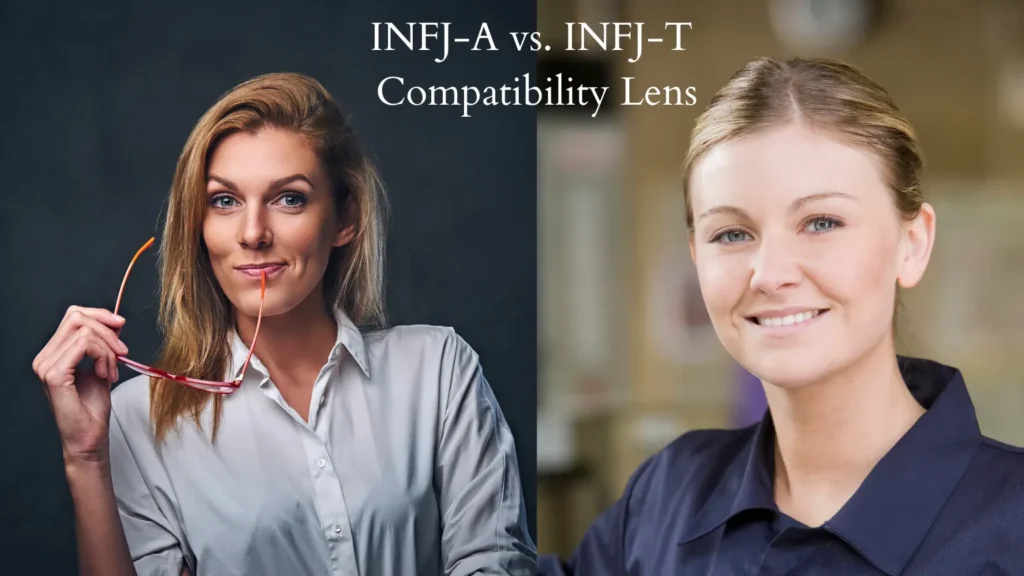
Not all INFJs are alike.
Even within our rare personality type, there’s a subtle but significant difference between INFJ-T (Turbulent) and INFJ-A (Assertive) and understanding this difference can completely change how we view compatibility, emotional processing, and the rhythm of relationship dynamics.
I personally identify as an INFJ-T, and my journey has been a dance between emotional depth, introspection, sensitivity to energy, and quiet transformation.
Over the years, coaching hundreds of INFJs and observing their relationship patterns closely, I’ve seen clear distinctions between these two subtypes – how they process love, handle stress, communicate needs, and choose their life paths.
Let’s explore them.
INFJ-A (Assertive): The Confident Seeker

INFJ-As, on the other hand, carry a different energetic flavor.
They often appear more grounded, ambitious, and outwardly confident.
They are the “go-getters” of the INFJ world – more proactive, decisive, and focused on external goals.
I’ve observed that INFJ-A clients and friends tend to be more resilient to day-to-day emotional turbulence.
They’re often better at compartmentalising, moving forward, and tackling challenges head-on.
They walk into rooms with presence.
They speak with conviction.
They don’t always show their emotional depth upfront – but it’s there, quietly fueling their vision.
But here’s what I’ve also seen: when INFJ-As break down emotionally, they break harder.
Because they’ve been holding it all in, managing, performing, achieving, until one day, it spills over.
They often appear “together” on the outside but carry a quiet emotional exhaustion underneath.
And unlike INFJ-Ts who express their emotions more fluidly over time, INFJ-As often delay processing until they reach a breaking point.
Strengths of INFJ-As:
- Decisive, action-oriented, and confident in their goals
- Strong at leading, organizing, and planning long-term missions
- Less prone to constant emotional self-doubt
- Seen as grounded, self-assured, and visionary
Challenges of INFJ-As:
- May suppress emotional needs to appear strong
- Can delay vulnerability or emotional expression
- Under extreme stress, they may collapse suddenly
- Often need to be reminded to slow down and check in with themselves
INFJ-T (Turbulent): The Sensitive Mystic

INFJ-Ts, like myself, tend to experience emotions more intensely.
We’re introspective, often self-critical, and deeply in tune with subtle energetic shifts in people and spaces.
We’re not the ones to jump at decisions instantly – but we’re often the ones who sense things before anyone else.
I’ve often found myself questioning:
“Am I overreacting?”
“Why do I feel this so deeply when no one else seems to notice?”
“Should I have spoken up? Or stayed quiet?”
And yet, time and time again, I’ve learned to trust my intuition because even when the logic wasn’t clear, my inner knowing always pointed to something real.
That’s the superpower of INFJ-Ts—we feel the truth, long before it’s visible.
We may take longer to act, but our actions, when they do come, are deeply aligned.
Strengths of INFJ-Ts:
- Extremely intuitive and emotionally intelligent
- Deep listeners, highly empathetic, and observant
- Tend to pick partners based on soul resonance, not external traits
- Usually more spiritually inclined or introspective
- Can guide relationships with emotional depth and inner clarity
Challenges of INFJ-Ts:
- Struggle with self-doubt and perfectionism
- May overthink or delay decisions
- Tend to absorb others’ emotions too easily
- Need frequent reassurance and emotional grounding from their partner
Compatibility Considerations
In romantic relationships, both INFJ-Ts and INFJ-As offer unique gifts.
But understanding which one you are and which one your partner is can prevent misunderstandings and enhance emotional safety.
INFJ-Ts often need:
- Reassurance, patience, and emotional nurturing
- A partner who honors their introspective timing and inner compass
- Freedom to process emotions without being rushed
INFJ-As often need:
- Respect for their independence and leadership instincts
- A partner who invites them into softness and emotional presence
- Encouragement to pause, feel, and be vulnerable without fear
A Final Thought from My Journey

Being an INFJ-T hasn’t always been easy.
There were times when I doubted myself too much, held in emotions until they burned me out, or delayed taking action on my dreams because I felt like I wasn’t “ready enough.”
But with time, healing, and love, I’ve come to embrace the gift of emotional sensitivity.
I’ve also worked with incredible INFJ-As—brilliant women and men who inspired me with their clarity, drive, and ambition.
But underneath their confidence, I often found a tender soul longing to be understood, not for what they do, but for who they are.
Whether you’re an INFJ-T or INFJ-A, know this:
Your journey isn’t about changing who you are – it’s about embracing your wiring with love, compassion, and clarity.
And when you’re in a relationship with someone who honors your INFJ subtype with presence and patience, magic unfolds.
Who INFJs Get Along With (Friendship & Team Dynamics)

When it comes to friendships, INFJs aren’t here for quantity.
We’re here for divine resonance – the kind of connection that feels like home to the soul.
We value trust over trends, soul over status, and spiritual alignment over social validation.
Over the years, I’ve been blessed with a handful of close friendships that have deeply shaped me – some surprising, some predictable, all sacred in their own ways.
Let me share a few real-life reflections with you.
INFJ – INFJ Friendships: The Sacred Mirrors

Let’s begin with one of the rarest and most profound friendship dynamics: INFJ-INFJ Friendships.
One of my closest friends is also an INFJ, and I genuinely feel like our connection is divinely orchestrated.
It’s the kind of friendship where you don’t need to explain your silences, your mood shifts, or even your dreams – they just get it.
No questions asked.
INFJ-INFJ friendships are deeply spiritual, emotionally intuitive, and built on profound mutual understanding.
You can talk about your childhood traumas, your visions for humanity, your private heartbreaks and you’ll be met with presence, not pity.
But here’s the truth no one tells you: INFJ-INFJ friendships are also soul mirrors.
You can’t fake who you are, because your INFJ friend will sense the incongruence.
If you’re hiding something or pretending to be someone you’re not, they’ll reflect that back – lovingly, but clearly.
Unless you’re willing to do the inner work, this friendship can get uncomfortable.
But if you’re both committed to truth and healing, it becomes the most transformative and lifelong connection you’ll ever know -second only to an INFJ-INFJ soulmate union.
INFJ – ENFJ Friendships – The Compassionate Mirrors

Some of my deepest, most soul-enriching friendships have been with ENFJ men.
ENFJs carry emotional warmth, natural leadership, and an incredible ability to hold space for others.
They help INFJs express their vision boldly and take action on their dreams.
In friendships, ENFJs often act like protectors – offering encouragement, enthusiasm, and a sense of “I believe in you” that INFJs quietly crave.
These friendships are often emotionally vibrant and spiritually charged.
INFJ – INFP Friendships – The Soul Companions

One of my best friends is an INFP, and being around them feels like entering a soft, magical world.
INFPs are poetic, thoughtful, and deeply caring.
We can talk for hours about shared values, spiritual philosophies, or abstract ideas and they often bring gentle, fresh perspectives that help me see life in new colors.
INFJ-INFP friendships can be incredibly heartwarming, but they require emotional honesty.
While we both care deeply, our emotional processing is different – Fe (INFJ) wants to harmonize and connect, while Fi (INFP) wants to protect inner integrity.
Once this difference is honoured, it becomes a beautiful complement.
INFJ – ISFP Friendship – The Artistic Confidants

One of my ex-partners was an ISFP, and though our romantic relationship didn’t last, our friendship during that time was genuinely beautiful.
We could sit for hours, talking about music, beauty, art, nature, and emotions.
ISFPs have this quiet way of pulling you into the present moment, helping INFJs relax into the here and now.
What worked best was the emotional softness we shared.
Even without big emotional outbursts, there was a gentle undercurrent of connection—two sensitive souls meeting in silence, simplicity, and honesty.
While we both care deeply, our emotional processing is different – Fi critic & Ti Child (INFJ) wants to speak out the harsh truth even though it hurts to listen, while Fi Hero & Ti Demon (ISFP) wants to keep idealising and does not accept their noticeable distortions in their fantasised visions.
This leads to a conflict, otherwise for a casual friendship INFJ-ISFP friendship is great.
INFJ – ISFJ Friendship – The Harmony Keepers

During my college days, one of my closest friends and roommates was an ISFJ.
We shared the same preference for harmony, gentleness, and creating peaceful living environments.
Both ISFJs and INFJs have Fe (Extraverted Feeling) in their top functions, which means we naturally prioritize emotional care, helpfulness, and maintaining peace in relationships.
Our friendship worked because it was steady, loyal, and warm.
We could support each other emotionally, and neither of us ever needed chaos or confrontation to feel alive.
INFJ – ISTJ Friendships – The Respectful Rocks

Now this might surprise you – one of my best friends is an ISTJ.
At first glance, we couldn’t be more different.
INFJs are intuitive, abstract, and future-focused; ISTJs are practical, concrete, and past-oriented.
I’m always talking about visions, possibilities, spiritual evolution – he’s focused on “what’s working now,” managing details, and minimizing risks.
We’ve had plenty of disagreements. But do you know what’s kept the bond alive?
Mutual respect.
ISTJs may not emotionally express things the way INFJs do, but they are fiercely loyal, consistent, and deeply caring once they trust you.
And it’s not just this one friend.
My father is also an ISTJ and I’ve had many meaningful friendships with ISTJs over the years.
They might not “get” you right away, but they stand by you when it matters. And that quiet form of devotion? It means the world to an INFJ.
INFJ – INTP Friendship – The Curious Minds

INFJs and INTPs often connect through deep intellectual discussions.
INTPs challenge INFJs to think with precision, and INFJs help INTPs connect with their emotions.
There’s a beautiful dance between logic and intuition, and when both sides are patient, these friendships can be thought-provoking and deeply rewarding.
INFJ – ESFJ Friendship – The Social Connectors

One of my best friends is an ESFJ, and though we’re very different on paper, our connection is surprisingly impactful.
ESFJs often struggle to see their long-term purpose clearly (due to Ni Trickster), and that’s where INFJs help illuminate their path.
In return, ESFJs bring INFJs real-world insights, social awareness, and opportunities we might otherwise overlook.
This dynamic creates a balance between vision and visibility. INFJs offer wisdom and clarity, and ESFJs help bring those ideas into the real world.
INFJ – INTJ Friendship – The Strategic Companions

INFJ–INTJ friendships are unique.
There’s something almost mystical about the bond between these two Ni-dominant types.
Both are future-focused, vision-oriented, and deeply introspective—but they come at it from different angles.
While INFJs move through life guided by emotional and spiritual undercurrents, INTJs are more focused on structure, precision, and logical frameworks.
What I’ve observed, both in my clients and friends, is that this contrast actually becomes a source of deep mutual respect.
In these friendships, INFJs often bring warmth, emotional insight, and intuitive clarity, while INTJs contribute strategic thinking, grounded action, and a clear path forward.
They help INFJs cut through emotional fog and organize their dreams.
In return, INFJs help INTJs soften their edges and connect more deeply to the human side of their purpose.
But here’s the real beauty, when both feel safe, these friendships can become powerhouses of personal growth and legacy-level impact.
Conversations between an INFJ and INTJ often feel like secret councils of the soul and mind, discussing how to change the world in quiet, revolutionary ways.
INFJ – ENFP Friendship – The Soulful Spark

One of my best friends during college was an ENFP, and that friendship still brings a smile to my face.
ENFPs are full of life, warmth, humor, and spontaneity—they breathe new air into an INFJ’s otherwise deeply internal world.
What I loved most was the chemistry – the way our conversations would swing from spiritual philosophies to ridiculous jokes in seconds.
ENFPs, with their dominant Ne (Extraverted Intuition), are constantly seeking novelty and possibilities.
INFJs, guided by Ni (Introverted Intuition), search for depth, clarity, and patterns.
At first, this makes the friendship magnetic.
ENFPs are fascinated by the depth INFJs bring, and INFJs are energized by the brightness ENFPs exude.
When the INFJ offers new insights, deeper meanings, or soulful perspectives, the ENFP is truly impressed.
But here’s the catch – ENFPs need variety to feel alive.
If the INFJ begins repeating the same patterns or ideas, or goes too deep into introspection, the ENFP may get restless and start looking for “the next big thing.”
It’s not personal – it’s just how they’re wired.
Despite the occasional misunderstandings due to our vastly different cognitive functions, I’ve found that INFJ–ENFP friendships can be transformative.
ENFPs often lifted me out of my emotional lows with enthusiasm and new possibilities.
And I’ve been able to help them find clarity when they felt scattered or uncertain about their purpose.
This is a friendship that teaches you balance – how to play and reflect, dream and anchor, expand and deepen.
What INFJs Truly Need in Friendships & Teams
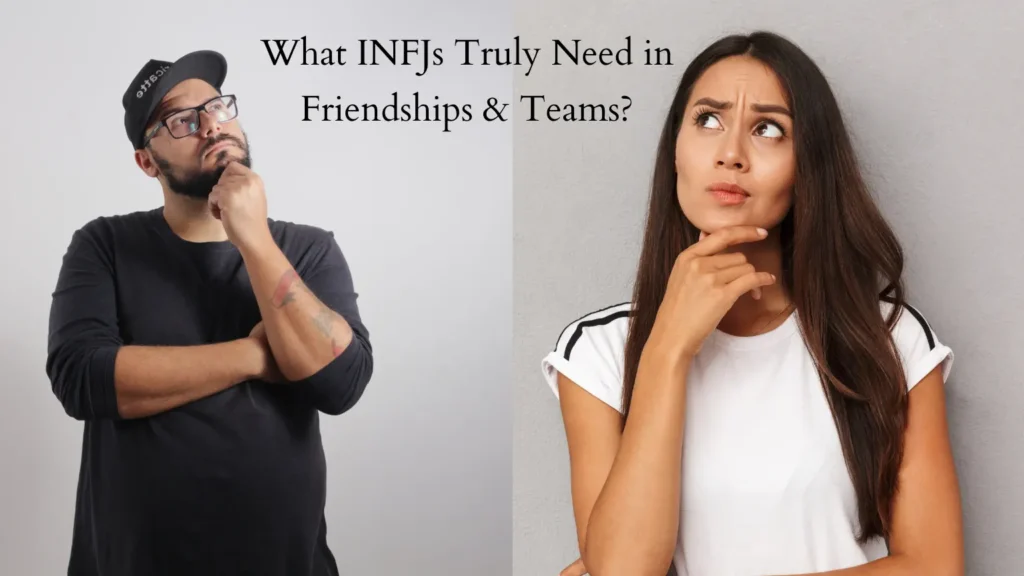
More than anything, INFJs need:
- Depth over quantity
- Consistency over charisma
- Emotional safety over superficial fun
- People who value their inner world, not just their outer actions
In team environments, INFJs don’t always take the spotlight, but they lead in their own quiet way.
They bring harmony, strategy, and deep emotional intelligence to any group they’re part of.
INFJs shine when:
- They’re trusted to work independently
- Their ideas are respected, not rushed
- The team values empathy and long-term vision
INFJs aren’t looking for a crowd.
We’re looking for a tribe that feels like home – people who don’t just talk, but listen with their soul… people who don’t just see us, but recognize us.
And when we find that kind of friendship – it’s sacred, and it lasts.
INFJ Least Compatible Types (Handled with Care)

I want to walk you into this section with honesty, compassion, and a whole lot of grace – because this isn’t about judgment or stereotyping.
It’s about emotional truth, lived experience, and energetic mismatches that INFJs often feel, but don’t always know how to explain.
Every relationship is unique.
Any two people can make it work with conscious effort and spiritual maturity.
But some types simply require so much translation that the emotional cost becomes too high for INFJs to bear long term.
You see, INFJs don’t just want connection – we want resonance.
And certain pairings, especially with types wired for high stimulation, constant variety, or surface-level interaction, can unintentionally leave INFJs feeling drained, dismissed, or like they’re speaking a language no one understands.
Let’s talk about a few of these—tenderly, truthfully.
ESTP – The Hyper-Realist

ESTPs live fast, act first, and often focus on tangible, real-world outcomes.
They’re grounded, bold, and thrive on action. While admirable, this kind of lifestyle can overwhelm an INFJ’s sensitive, introspective inner world.
I’ve seen INFJs in ESTP relationships end up feeling emotionally invisible.
Also, because ESTPs are Fi Trickster, so they are also not connected with their own feelings.
Deep talks are rare. Intuition is brushed off.
And emotional needs are often seen as “too much.”
To an ESTP, INFJ depth may feel confusing.
To an INFJ, ESTP’s focus on external stimulation may feel… empty. And slowly, a wall of emotional loneliness builds.
ESFP – The Entertainer

ESFPs are vibrant, loving, and full of zest.
Their energy lights up a room, and they truly enjoy people.
But here’s the rub – they live in the now.
They often shy away from painful introspection or abstract conversations that feel heavy.
In the beginning, an INFJ might be enchanted by an ESFP’s playfulness and charm.
But over time, the INFJ begins to crave depth while the ESFP craves freedom from depth.
ESFPs might say, “Why overthink everything? Just enjoy life.” And while their intent is pure, the INFJ hears, “Don’t be who you are.”
This misalignment leads to one of the hardest feelings for an INFJ: being too much for someone we love.
That’s when we shrink. And that’s never good.
ENTP – The Endless Debater

ENTPs are brilliant, quick-witted, and full of fascinating ideas.
But to an INFJ, constant mental sparring can feel like emotional whiplash.
ENTPs love to challenge. INFJs love to connect.
ENTPs often debate for fun. INFJs share from the heart.
In friendships, this may work. But in love?
The INFJ starts feeling exhausted from defending their emotions, intuition, and values.
ENTPs often don’t mean harm, but their intensity and unpredictability can destabilize an INFJ’s inner peace.
ESTJ & ENTJ – The Commanders

Powerful, decisive, and achievement-oriented – these types are born leaders.
But in a romantic connection with an INFJ, they can sometimes come off as overly controlling, emotionally dismissive, or too focused on “results over resonance.”
INFJs in relationships with ESTJs or ENTJs often feel emotionally unheard.
Their intuitive insights are waved away as impractical, and their emotional needs labeled irrational.
Unless there’s profound emotional intelligence on both sides, this match often leaves the INFJ questioning their worth.
ISTP & INTP – The Emotionally Distant Observers

ISTPs and INTPs often mean well.
They’re loyal in their own way, and can offer steady intellectual companionship.
But emotionally?
Many INFJs in these relationships have told me, “I feel like I’m in this relationship alone.”
It’s not that ISTPs or INTPs don’t care – they just have a very different love language.
They intellectualize feelings that INFJs long to express vulnerably.
Over time, INFJs may feel starved for emotional reciprocity, which leads to silent suffering and eventual emotional withdrawal.
A Loving Reminder to INFJs

If you’re currently in a relationship with one of these types, this isn’t a verdict – it’s an invitation.
An invitation to:
- Name what’s hard
- Express what you feel
- Stop shrinking to be loved
Some of the deepest lessons in my life came through connections with types I wasn’t “supposed” to work with.
But I also learned that soul compatibility doesn’t mean struggle every day.
You don’t need to beg to be understood.
You don’t have to earn emotional safety.
You deserve a love that feels like exhale, not effort.
So if you’re in a relationship that constantly makes you question your intuition, your emotional needs, or your truth – it’s okay to ask yourself: Is this alignment or just attachment?
You get to choose truth. You get to choose peace.
And you get to love from a place where you’re fully seen, not constantly managed.
Conclusion: What INFJs Deserve in Love

If you’ve made it this far, dear INFJ, know this – you’re not alone.
Your desire for soul-deep love, emotional safety, and divine connection isn’t “too much.”
It’s just rare. And rare things are often misunderstood.
You’ve probably spent years being told you’re complicated… that you feel too deeply, think too much, or dream beyond what’s “practical.”
You’ve maybe even tried to suppress your intuition, tone down your emotions, or shrink your vision to fit into a relationship that wasn’t made for your soul.
I’ve done that too.
And I can promise you – the moment you stop pretending, the real magic begins.
You deserve a love where you don’t have to over-explain your heart.
Where your silence is understood.
Where your sensitivity is cherished, not criticized.
Where you feel seen, safe, supported, and spiritually aligned.
In my journey as an INFJ man who found his INFJ soulmate after years of emotional longing and inner searching, I realized one truth that changed everything:
You don’t need to be everything for everyone.
You just need to be your truest self – and meet the one who sees your soul in all its colors.
Let love feel like breathing.
Let it nourish your purpose.
Let it hold you without taming you.
You’re not here for surface love.
You’re here for sacred union.
And I hope this guide helped you walk one step closer to it.
Ready for More?
If this blog moved something in you, I invite you to continue the journey:
👉 INFJ Personality Type: Best Key Traits, 8 Strengths and Weaknesses
